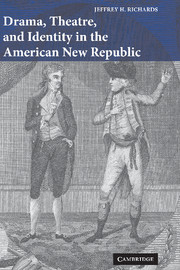Book contents
- Frontmatter
- Contents
- Acknowledgements
- Introduction
- 1 American identities and the transatlantic stage
- PART I Staging revolution at the margins of celebration
- 2 Revolution and unnatural identity in Crèvecoeur's “Landscapes”
- 3 British author, American text: The Poor Soldier in the new republic
- 4 American author, British source: writing revolution in Murray's Traveller Returned
- 5 Patriotic interrogations: committees of safety in early American drama
- 6 Dunlap's queer André: versions of revolution and manhood
- PART II Coloring identities: race, religion, and the exotic
- PART III Theatre, culture, and reflected identity
- Notes
- Bibliography
- Index
2 - Revolution and unnatural identity in Crèvecoeur's “Landscapes”
Published online by Cambridge University Press: 22 September 2009
- Frontmatter
- Contents
- Acknowledgements
- Introduction
- 1 American identities and the transatlantic stage
- PART I Staging revolution at the margins of celebration
- 2 Revolution and unnatural identity in Crèvecoeur's “Landscapes”
- 3 British author, American text: The Poor Soldier in the new republic
- 4 American author, British source: writing revolution in Murray's Traveller Returned
- 5 Patriotic interrogations: committees of safety in early American drama
- 6 Dunlap's queer André: versions of revolution and manhood
- PART II Coloring identities: race, religion, and the exotic
- PART III Theatre, culture, and reflected identity
- Notes
- Bibliography
- Index
Summary
The american revolution prompted a number of putative American playwrights to adopt dramatic form in order to translate the swirl of political, economic, and military upheavals in their midst. The majority of these plays stake out ideological positions that leave little doubt of their intention. Mercy Warren's three political satires, The Adulateur, The Defeat, and The Group, resolutely stick Massachusetts royal governor Thomas Hutchinson and his followers on her well-hoisted poniard in the service of whig politics. For his part, Hugh Henry Brackenridge turns the Quebec expedition of December 1775, with its fallen hero, General Richard Montgomery, and the Bunker Hill battle of the following spring into heroic tragedies, while John Leacock pillories the British government and celebrates early American successes in his Fall of British Tyranny. On the tory side, there are fewer examples of closet political plays that have survived, but The Battle of Brooklyn, for one, mocks the incompetence of Washington and his army in the New York campaign of 1776. Given the polarizing atmosphere of the 1774–1776 period in particular, such clear denomination of party and cause is not surprising. For these playwrights, the markers “British” and “American” take on new meaning; new identities are quickly forged in the world of these plays, patriot and loyalist, rebels and tyrants. Such plays serve to rally or mock, stir or propagandize. This is not to say that each play does not have its subtleties.
- Type
- Chapter
- Information
- Publisher: Cambridge University PressPrint publication year: 2005



